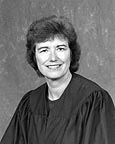February 18, 2005
Virginia justice to serve as jurist-in-residence

As the first William L. Beatty Jurist-in-Residence, Lacy will visit with students in several classes and meet informally with faculty and senior staff during her visit, Feb. 23-26 in Carbondale. The program is one of three the law school created from proceeds received last summer from the settlement of a multi-million dollar national class action protection lawsuit.
The program honors William L. Beatty, a federal judge for the U.S. District Court of Illinois, who died in 2001.
Lacy will discuss the kinds of cases she hears as a justice, and spend "considerable time talking about professionalism and ethics," Dean Peter C. Alexander said.
"It's a great opportunity for students who spend most of their time reading appellate cases to meet an appellate justice, to talk to her about how the appellate courts work, how they reach decisions, and how important precedent is," he said.
Students will learn first-hand "from somebody who champions professionalism and ethics around the country," Alexander said. "She is a great example of a good lawyer and a great justice."
Lacy won re-election for a second, 12-year term to the Supreme Court of Virginia in 2001. She received her law degree from the University of Texas School of Law, and her Master of Laws degree from the University of Virginia School of Law in 1992.
She worked for the Texas Legislative Council and was a special assistant and deputy attorney general in the Texas Attorney General's Office. In 1985, Lacy became a judge on the Virginia State Corporation Commission.
She currently chairs the American Bar Association's Section of Legal Education and Admission to the Bar.
Last year, the law school received $425,000 in unclaimed funds from a 2001 settlement reached in the Southern District of Illinois involving MCI over allegations some subscribers paid higher non-subscriber rates and surcharges for direct-dialed long distance telephone calls. MCI did not admit liability in the settlement, which totaled $88 million, with $10 million returning to MCI. More than 338,000 claims were paid.
In class action lawsuits, courts distribute unclaimed funds in a manner consistent with the basis for the lawsuit.
Offering a progressive education to graduate students and professional students is among the goals of Southern at 150: Building Excellence Through Commitment, the long-range development plan that guides the University to its 150th anniversary in 2019.
